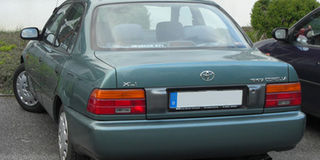Why is my Toyota misfiring and leaking oil?

What you need to know:
- The PCV also helps to stabilise engine running by channeling the blow by gases to the intake manifold where they are delivered to the combustion chambers to improve efficiency of combustion.
Hello Paul, my Toyota Corolla has 186,000kms. It has been performing well over the years until recently when it started misfiring, consuming and leaking oil. My mechanic has changed the fuel filter, spark plugs and ignition cables but the car still misfires and the engine has erratic idle and lacks power. Can you help? John
Hello John, the cocktail of symptoms, despite your mechanics intervention, can be confusing. Given the mileage of your Toyota and the symptoms you have experienced, it would be a good idea to investigate the engine Positive Crankcase Ventilation valve (PCV) to confirm that is not spoilt or blocked. The PCV uses engine vacuum to release engine blow by gases from the crank case.
The PCV also helps to stabilise engine running by channeling the blow by gases to the intake manifold where they are delivered to the combustion chambers to improve efficiency of combustion.
When a PCV valve is worn out or damaged, there are symptoms that can help you tell. There is a buildup of internal engine pressure.
This will lead to a failure of internal engine oil seals and gaskets and usually results in oil leaks. There will be a gradual buildup of moisture and sludge and engine misfire or surging. When you inspect the engine ventilation or PCV valve and intake hose to throttle potentiometer, you will notice intrusion of engine oil which combines with other leaks and leads to increased oil consumption.
In some cases the engine will experience hard starts and rough idling. In extreme circumstances, there will be expensive damage. Often the PCV valve is ignored during routine service. Consider replacing it if you find it faulty.
Is my car starter motor faulty?
Hello Paul, I have recently acquired a locally used Toyota Ipsum 2002 model. Lately, it fails to start and only makes a clicking sound when I turn the key. Is the starter faulty or do I need to replace it?
Kabagambe
Hello Kabagambe, before you conclude that the starter motor is faulty, first check power supply and contacts. The battery terminals must be free of corrosion and tightly fastened. You will need a good car electrician to inspect the starter motor circuit which includes the relay and connections to its power supply terminals. The other cause of a starter motor failure is a faulty solenoid.
Rarely will you find a damaged or corroded circuit affecting the solenoid. If the solenoid is fine, the starter can be dismantled to inspect the starter brushes which are supposed to make contact with the commutator.
It is common to find that a faulty starter motor just needs a replacement of the contact brushes. The electrician will decide whether your starter motor is repairable or not.
A quality used one from engine breakers is your next affordable option.
How often should I replace brake fluid?
I read in one of your articles that brake fluid needs to be replaced every two to three years. But the brake fluid at the master cylinder of my car looks clean and I have never changed it. Kindly throw some more light.
Allan
Hello Allan, one of the factors why brake fluid ought to be renewed every two years is the tendency to build moisture content during use. Brake fluid is hygroscopic and attracts moisture as you operate the brake system. This moisture gradually makes the brake fluid corrosive and if kept for long will lead to corrosion damage of pistons, cylinders and brake lines.
While the brake fluid in the reservoir bottle may look clean, often we find brake fluid in the lines and cylinders mixed with dark after burn deposit and corrosion from the frequently heated brake system.




